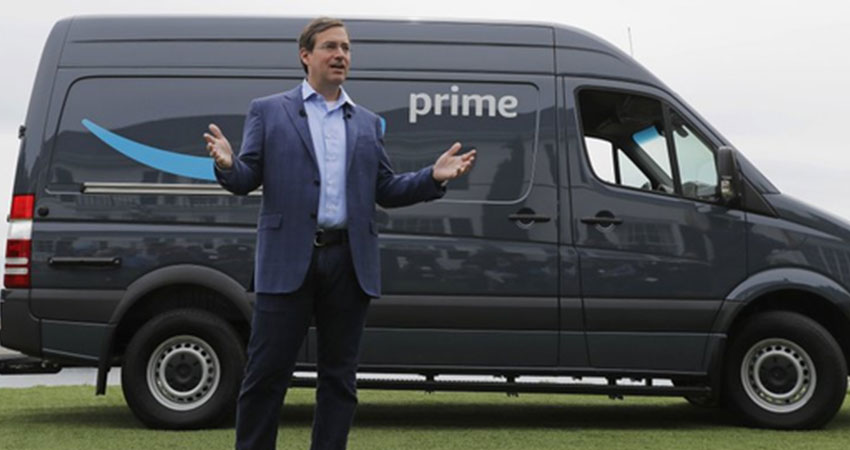Dave Clark, soon-to-be co-CEO of Flexport (photo credit: Ted. S Warren/AP)
Dave Clark, the 23-year Amazon veteran who unexpectedly stepped down last week after helping create its vaunted logistics operations, which became grossly overbuilt in the pandemic era, has been tapped as co-CEO of hot supply chain and freight forwarding company Flexport.
Industry observers were mixed on the impact of Clark’s hiring on Flexport, which reported $3.2 billion in revenue in 2021 and said it is profitable. It’s certainly beloved by investors, raising an eye-popping $2.3 billion to date, most recently $935 million in February, giving it a nearly $8 billion valuation.
Clark, who had been the CEO of Amazon’s worldwide consumer business, will begin as co-CEO with Flexport founder and head Ryan Petersen on Sept. 1, continuing for six months, after which Petersen will serve as executive chairman.
In a LinkedIn post explaining his move to Flexport, Clark spoke of “the vital importance of fast, reliable delivery services” during the pandemic, and how the supply chain has “entered the national discourse, for all the wrong reasons” and “suffers from a significant fragmentation of technology and process.”
“(Petersen) and his team have thrown themselves at this problem by brilliantly tackling the most complicated piece of the supply chain: The global cross-border movement of goods,” Clark wrote. “It is an area where few technology companies have dared to tread because of the vast array of regulatory rules, intimidating geographical distances and siloed network of providers.”
“Over the last two decades, Dave helped scale Amazon into the technology and supply chain juggernaut it is today,” Petersen said in a statement. “He is a builder and an entrepreneur at heart, with the leadership experience that will shepherd Flexport into the most exciting phase of our journey.”
While it’s unknown how long this partnership was in the works, Petersen was recently effusive in his praise of Amazon’s logistics business. He also boasted Flexport could be “one of the biggest companies in the world, if we live up to our potential.”
“Amazon is the best logistics company in the world, and I say that very humbly, because I’d like Flexport to be the best logistics company in the world,” Petersen told CNBC a few weeks ago. “But we haven’t earned that right, and I really look up to Amazon and try to learn as much as we can from how they operate,” he said. “There is still so much hustle in that company.”
Dean Maciuba, managing partner of Crossroads Parcel Consulting, said the big question is whether Clark would move Flexport toward developing its own physical assets “that will drive new revenue sources,” vs. its current constitution as a platform for managing end-to-end supply chain flow.
Asked how much of what Clark built at Amazon could be transferred to Flexport, given NDA constraints, Maciuba said the company “already has very good technology that Dave Clark would not have to totally re-engineer,” again emphasizing the importance of a physical build-out.
Bill Paul, founder and chairman of freight forwarding recruiting, training and coaching firm Logitalent, said while Clark’s track record is certainly stellar, Flexport might have been better served by a top executive from a global freight forwarder.
“He doesn’t know the (industry), the people and the customers,” Paul said, noting the respected Journal of Commerce was underwhelmed. “Therefore, I can’t see it having any kind of significant impact on Flexport’s growth. It’s a move that’s more likely to impress Silicon Valley and the investment community that Flexport loves so much. It’s interesting publicity if we don’t scratch beneath the surface.”
Satish Jindel, president of shipping data firm ShipMatrix, said the nature of Amazon’s NDAs means Clark would be extremely limited in his ability to recruit from his former employer. In any event, Jindel said, those with the required skillset to help Flexport would be mostly limited to Amazon’s freight forwarding arm as a non-vessel operating common carrier (NVOCC) from China to the U.S.
“There are a lot of things he’s done, in terms of developing Amazon’s fulfillment and transportation network, which are not the things that Flexport needs,” Jindel said. “If they do try to do that, there are bigger challenges and many more billions to raise. Especially in this market, those are very difficult value propositions to advance and raise money.”
Marc Wulfraat, president of global supply chain logistics consulting firm MWPVL International, said Amazon has “big shoes to fill” with Clark gone. His departure was noted in a June 3 memo from Amazon CEO Andy Jassy, and the company has not named a replacement.
“Not only did he build out their global retail fulfillment business, which is an empire in and of itself, but concurrently he also built up the Amazon Logistics network over the last 8 years. It’s an incredible accomplishment given the magnitude of package volume that Amazon ships that will soon rival UPS’s domestic small package volume in the U.S.”
The task of replacing Clark is especially difficult given the “challenging times” that Amazon is entering, Wulfraat said.
“They need a highly disciplined officer to take over their supply chain, in order to make the difficult decisions that lay ahead in terms of rationalizing the network and restoring health to the income statement in relatively short order,” he said.
Amazon roughly doubled its fulfillment and distribution footprint between 2019 and 2021, with excess space contributing $2 billion of the company’s recent $3.8 billion loss.

